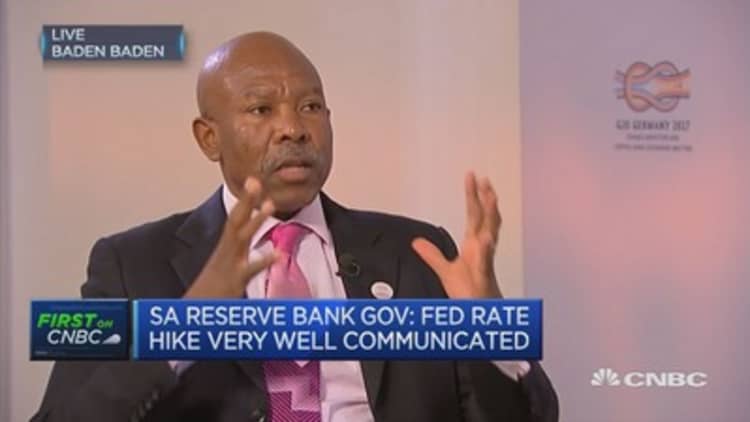
Improved communication from the U.S. Federal Reserve meant that Wednesday's decision to raise interest rates by 0.25 percent was already priced in by South Africa and other emerging markets, the governor of the South African Reserve Bank has said.
Lesetja Kganyago, the central bank's governor, told CNBC Friday that the country has now become less susceptible to capital flow fluctuations now that the Fed is managing its monetary policy in a predictable manner, leading him to regard further hikes as a matter of "when not if."
Already the U.S. central bank has signalled two further hikes this year.
"In 2013, when the Fed indicated that rates could be going up, I think markets were taken by surprise, I think that the communication was bad. But since then the Fed has communicated in a very consistent manner."
Kganyago added that the country had previously expected a realignment of exchange rates when the Fed pushed on with its tightening agenda, however he said he suspected that markets have become wise to this.
"When the Fed starting raising rates I think we expected that there would be a reversal of flow, there would be a realignment of exchange rates, but now that the Fed is communicating so well the question is always going to be how much of the changes have been priced in."
The South African rand has nearly halved in value against the US dollar over the past five years, as the country battles economic and political turmoil.
Protectionism is 'not good for anyone'
Protectionism, particularly from the world's largest economy, will breed closed trade policies and, ultimately, damage the global economy, Kganyago also said.
"Protectionism is not good for anyone," he noted, speaking to CNBC ahead of this weekend's G20 meeting of finance ministers in Germany.
"When protectionism takes place and it comes from the largest economy in the world, you may have other countries responding, and then you have got a rise in protectionism.
"With a rise in protectionism, in the final analysis, the global economy can only be losers."


